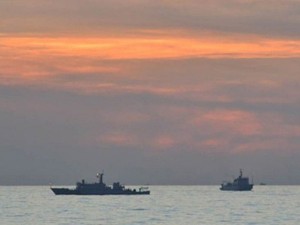China media: Threats to regional stability groundless
MANILA, Philippines – Despite protests from China’s neighbors against its newly imposed fisheries law in the West Philippine Sea (South China Sea), Chinese experts said the fears of threats to regional stability are “totally groundless.”
“Allegations calling the law a threat to regional stability are totally groundless,” Li Guoqiang, a researcher of Southeast Asian studies at the Chinese Academy of Social Sciences was quoted as saying by Chinese state press agency Xinhua in an article Wednesday.
“The new regulation contains 41 articles, most of which prescribe requirements for domestic fishing activities. Only one article applies to foreign incomers, and it conforms with international law,” Li said.
The rule on foreign vessels entering the waters of Hainan province require them to seek permission from the government before conducting fishing or surveying activities or else face confiscation of their catch and equipment and face fines of up to $82,800 or 500,000 yuan.
Department of Foreign Affairs (DFA) spokesman Raul Hernandez previously said that Hainan’s new law passed in November 2013 and took effect on January 1, 2014 “threatens regional peace and stability.”
Article continues after this advertisement“This development escalates tensions, unnecessarily complicates the situation in the South China Sea, and threatens the peace and stability of the region,” Hernandez said.
Article continues after this advertisementVietnam has also protested against the new rules and called for its abolition.
Previous incidents
Jay Batongbacal, director of the University of the Philippines’ Institute for Maritime Affairs and Law of the Sea, said in an interview with INQUIRER.net that recent violent incidents with Chinese maritime enforcement authorities provide the basis for the protests of China’s neighbors.
“The fears that this [fishing rule] might create an incident are not totally groundless. Even before Scarborough shoal there was already a couple of confrontations between Chinese fishermen, Chinese maritime enforcement authorities and Vietnam and Indonesia,” he said.
In April 2012, Chinese fishermen were found illegally poaching in Scarborough Shoal, also known as Bajo de Masinloc or Panatag Shoal.
Philippine authorities however were prevented from apprehending them when Chinese ships came to block them. Chinese ships have since retained control of the shoal after weeks of tense standoff.
Vietnam has also protested against China for an alleged shooting incident last March 20, 2013. A Vietnamese fishing boat claimed it was fired upon by a Chinese Maritime Surveillance Vessel near the Paracel Islands, which is claimed by both parties to be part of their territory.
“This is a serious case of violating Vietnamese sovereignty, threatening the lives and damaging the properties of Vietnamese fishermen,” an official statement from Vietnam was quoted as saying by the The Wall Street Journal in report published last March 26, 2013.
The fishing boat owner recounted that the fishermen showed to the Chinese vessel that they were unarmed but it still “shot four or five times at our cabin,” the report said.
“Those kinds of incidents are the ones that provide the basis for the concerns of these other countries,” Batongbacal said.
China claims the entirety of the South China Sea as part of its territory including portions of the Philippines 200 nautical mile exclusive economic zone (EEZ) as well as the EEZ of Vietnam and Malaysia.
“The Philippines is not the only country adversely affected by these regulations. These regulations seriously violate the freedom of navigation and the right to fish of all states in the high seas, as provided for under UNCLOS,” Hernandez said.
The Philippines has filed for arbitration proceedings against China before the United Nations arbitral tribunal last January 2013. China, however, has refused to participate insisting on bilateral talks.
The Philippines is set to submit its written arguments on the case in March 2014.
Related stories
PH won’t recognize China fisheries law
DFA: Filipino fishermen can venture into West PH Sea despite China fisheries law
For comprehensive coverage, in-depth analysis, visit our special page for West Philippine Sea updates. Stay informed with articles, videos, and expert opinions.
